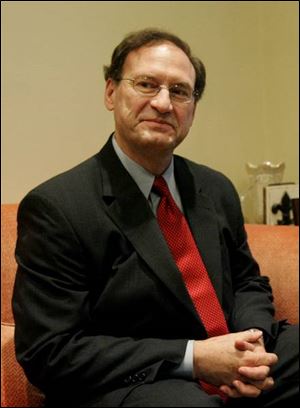
Sides debate damage done by Alito words in application
11/20/2005
Democrats have raised concerns about the abortion views of Supreme Court nominee Samuel A. Alito, Jr.
To some liberals, it is the smoking gun critics of the Supreme Court nominee Samuel A. Alito, Jr., have been looking for - a 1985 job application in which Judge Alito wrote that he was proud to have participated in the Reagan Administration's arguments in the Supreme Court against abortion.
"Alito's own words reveal his anti-choice legal philosophy," was the way NARAL Pro-Choice America summarized the application.
But for Judge Alito's defenders, his successful application for the post of deputy assistant attorney general is ancient history.
"A statement by Judge Alito two decades ago questioning the constitutionality of the right to an abortion cannot be used to disqualify him for a seat on the high court," said Jay Sekulow, chief counsel of the American Center for Law justice founded by the Rev. Pat Robertson. "The Senate should focus on Judge Alito's judicial philosophy and his 15-year record of service on the U.S. Court of Appeals for the 3rd Circuit."
Smoking gun or old news? The truth about the 20-year-old letter is probably somewhere in between.
The job application - in which Mr. Alito, then a lawyer in the solicitor general's office, stressed his conservative and Republican credentials - does not paint a dramatically different picture from the image of Chief Justice John Roberts that emerged from memos he wrote as a young Reagan administration lawyer.
Still, the unusually personal language in the application has put Judge Alito on the defensive and prompted Sen. Arlen Specter, the chairman of the Senate Judiciary Committee, to ratchet up the scrutiny he plans to apply to the nominee. And, unlike Chief Justice Roberts, Mr. Alito won't be able to say decades-old statements bearing his name reflected the views of his employers or clients.
Judge Alito was being anything but shy about his views in applying to be deputy assistant attorney general under then-Attorney General Edwin Meese.
"It has been an honor and source of satisfaction for me to serve in the office of the solicitor general during President Reagan's administration and to help advance legal positions in which I personally believe very strongly," he wrote. "I am particularly proud of my contributions in recent cases in which the government has argued in the Supreme Court that racial and ethnic quotas should not be allowed and that the Constitution does not protect a right to abortion."
To Judge Alito's critics, these sentiments cinch the case that he would be a right-wing ideologue on the high court.
In a mass e-mail to reporters headlined "Connecting the Dots," the activist group Alliance for Justice linked points made in Mr. Alito's job application and his later decisions in appeals court cases dealing with criminal procedure, church and state, and federalism. On abortion, the Alliance noted, "in the only case in which he participated that presented an open question on women's reproductive rights, Judge Alito wrote in dissent that he would uphold a law requiring a woman in certain circumstances to notify her husband before obtaining an abortion."
Not surprisingly, Judge Alito's defenders connect the dots differently.
"I think the application isn't significantly informative," said Todd F. Gaziano, director of the Center for Legal and Judicial Studies at the Heritage Foundation. "The critics are trying to build a mountain out of a pimple."
Mr. Gaziano noted - as Judge Alito himself has done in conversations with senators this week - that the comments that have created controversy were contained in an application for a position that mixed law and politics.
On abortion, Mr. Gaziano said, "He was saying, I'm proud of my work in the administration in several areas" - including abortion. Besides, Mr. Gaziano added, in three out of four cases as an appeals judge, Judge Alito, applying precedent, ruled in favor of abortion rights.
Finally, Mr. Gaziano said the paper trail left by Judge Alito isn't very different from that of Chief Justice Roberts, who was confirmed by the Senate despite the fact that he supported Reagan and Bush administration legal positions and signed a brief in which the solicitor general's office said Roe v. Wade was wrongly decided.
Some liberal commentators point to a difference that could complicate Judge Alito's confirmation.
"There is a difference between the Alito letter and Roberts' papers because Alito's opinion is labeled as a personal statement," said Mark Tushnet, a law professor at Georgetown University. "The paper trail for Roberts was less easy to follow because in most of those memos he wasn't expressing a personal view.
"This letter doesn't have evidentiary significance, because anyone who looked at Alito's record the day before this was released would know he was an extreme conservative," Mr. Tushnet added. "But it does matter politically. This will slow some Democrats from signing on."
The existence of the application also could make it harder for Judge Alito to evade questions from the Senate Judiciary Committee about his current views on the constitutionality of abortion and affirmative action.
Whatever the focus of the anti-Alito campaign, Mr. Gaziano warned opponents that they would have to reckon with another reality - that the voters who elected George W. Bush expected him to name conservatives to the high court.
"Americans understand that judicial selection was one of the issues in the 2004 election," Mr. Gaziano said. "They expected that the election would make a difference."
Contact Michael McGough at: mmcgough@nationalpress.com.